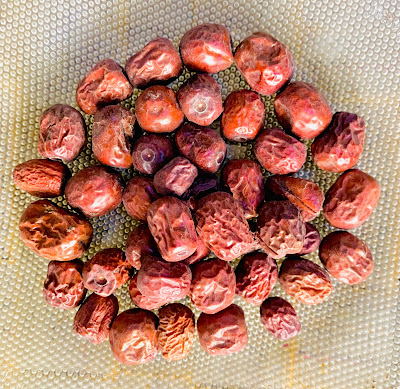Ziziphus Jujuba Mill: A Comprehensive overview
Introduction
Jujube, also known as Ziziphus jujuba, is a small deciduous tree or shrub that belongs to the buckthorn family (Rhamnaceae). Native to China, jujube has been cultivated for over 4,000 years and is now grown in various parts of the world, including the Middle East, India, and parts of Europe and the United States.The tree typically grows to a height of 5 to 12 meters. The fruit, commonly referred to as jujube or Chinese date, is oval and about the size of a small plum. It has a thin, edible skin and a sweet, chewy flesh that turns dark brown and wrinkled when dried.The leaves are shiny, green, and ovate to lanceolate in shape. The flowers are small, yellow-green, and bloom in late spring to early summer.

Botanical Name:
Ziziphus jujuba Mill
Family:
Rhamnaceae
Urdu Name:
Unnab
English Name:
Jujube
Parts Used:
Fruits
Temperament:
Jujube is considered to have a balanced temperament (moderate) leaning slightly towards moistness.
Geographical Source:
This plant is found in regions such as India, China, Russia, Asia, and Europe.
Organoleptic Evaluation:
Taste: The taste is predominantly sweet, with slight sour and astringent notes.
Odour: It has a sweet, fruity, and slightly floral aroma.
Texture: The fruits are soft and juicy.
Appearance: They appear red or reddish-brown with a shiny and smooth skin.
Pharmacological Actions / Functions:
Jujube fruits act as an
Emollient
Suppurative
Expectorant
laxative
Blood purifier.
When mixed with honey, the fruits serve as a demulcent and expectorant, beneficial in treating respiratory conditions. The fruits are also mucilaginous, febrifuge, mildly laxative, and tonic.
Specific Action:
Jujube fruits are known for their blood purifying properties and their effectiveness against hoarseness in the throat.
Chemical Constituents:
Jujube contains
Vitamin C
Phenolics
Flavonoids
Triterpenic acids
Polysaccharides
Iron
Amino acids
Nucleotides
Fatty acids
Dietary fiber
Alkaloids
Jujubosides A and B
Catechin
Magnoflorine.
Mode of Action:
1-Sedative Effect:
Flavonoids, active chemical constituents in jujube, have calming and relaxing effects on the central nervous system. They help reduce anxiety and promote better sleep by interacting with neurotransmitter receptors in the brain. Flavonoids can influence serotonin levels, contributing to improved mood, regulated sleep, and overall well-being.
2-Anti-inflammatory:
Jujube exhibits anti-inflammatory properties by inhibiting inflammatory pathways in the body, reducing the production of pro-inflammatory molecules, and decreasing inflammation. Flavonoids in jujube protect the liver from damage, support liver function, and aid in detoxification. Additionally, these flavonoids can impact carbohydrate digestion and absorption by influencing the activity of amylase.
3-Low Blood Count or Anemia:
Jujube can prevent and treat anemia by increasing hemoglobin production. It stimulates the liver to produce erythropoietin, a hormone that promotes red blood cell production. The iron content in jujube is essential for hemoglobin production. The fruit may also stimulate the spleen, enhancing its role in removing old or damaged red blood cells and recycling iron, thus aiding in the production of new red blood cells. Additionally, jujube may modulate the immune system to address anemia related to chronic infections or inflammation.
Medicinal Uses:
- Jujube fruits of the cultivated varieties are mostly sweet and less acidic. When ripe and dried, they serve as a mild laxative and expectorant. Made into conserves or cakes, the fruits help manage bilious complaints and improve digestion.
- The fruit is used to reduce blood heat and bring a cooling sensation to the body. It is effective in relieving respiratory catarrh, nasal catarrh, flu, cough, and hoarseness of the throat. Jujube fruits are administered as decoctions or infusions to purify the blood by removing waste matters or excessive humors, making it beneficial for conditions like syphilis, scabies, and other skin ailments.
- An infusion or cold decoction with Sisymbrium irio seeds (Khakshi) is useful against periodic fevers. The fruit helps refine viscid humors and eliminates waste products through its aperient and demulcent activity. In seasonal catarrhal affections, particularly of the upper respiratory tract, a decoction of jujube fruit combined with other suitable herbs is highly effective.
Compound Preparations:
Jujube is used in various traditional preparations, including
Sherbet Unnab
Sherbet Aijaz
Laooq Sapistan
Saduri
Itrifal Zamani
Dayaquza
Sherbet Arzani
Joshanda
Sherbet Khakshi
Sherbet Zufah Murakkab
Sherbet Shafa
Sherbet Murakkab Musaffi Khun
Joshina
Arq Murakkab Musaffi Khun
Laooq Sapistan Khayar-Shambari
Khamira Abresham Shira-i-Unnabwala
Dosage:
The recommended dosage is 5 to 7 fruits, up to a maximum of 9.
Corrigent:
Honey, Rosa damascena Mill., and sugar can be used to correct any potential imbalances.
Tenedium:
Sapistan (Cordia latifolia Roxb.) serves as an alternative.
Side Effects:
Jujube is a safe blood purifier for all age groups when used in recommended doses. However, prolonged excessive use can be harmful to the stomach due to its emollient action, causing extra moistness and potentially slowing down overall activity in the alimentary canal.
Prescription:
Syrup
(Beneficial for Blood purifier, Scabies, allergy, Acne, pigmentation, Boils ,Digestive system)
Jujube fruit (Unab) 100g
Sphaeranthus Indica (Gul Mundi) 10g
Nelumbium nuciferum (Gul Nilofer) 10g
Santalum album (Sandal safed) 10g
Rosa (Red rose) 10g
Conclusion:
In conclusion, the jujube fruit is a remarkable and versatile fruit with a rich history of cultivation and use, particularly in traditional Chinese culture. Its adaptability to various climates and soils makes it a viable crop in many parts of the world. The fruit’s nutritional benefits, including high levels of vitamins and minerals, contribute to its popularity in both culinary and medicinal applications. Whether consumed fresh, dried, or as an ingredient in various dishes and teas, jujube offers a unique flavor and a wealth of health benefits, securing its place as a valuable and enduring fruit.
